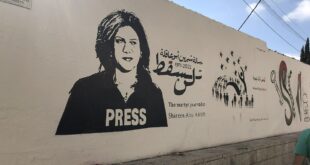Issue 35, winter/spring 2023 https://doi.org/10.70090/KO23CNSS Abstract This article looks at counter-narratives of sub-Saharan migrant women in the digital public sphere in Morocco. It aims to highlight the civic engagement of migrant social media activism. Whereas migration and media have been covered in other contexts, this study contributes to the debate …
Read More »Awareness of Deceptive Product Reviews and its Impact on Purchasing Intentions among University Youth: A Survey Study (Arabic)
Issue 35, winter/spring 2023 https://doi.org/110.70090/HNA23ACP Scroll down for Arabic abstract. Deceptive reviews are increasingly prevalent online. Considering existing literature, there are not sufficient research studies that seek to understand the role of deceptive product reviews in affecting acts of online purchasing in the Arab world. This paper attempts to investigate …
Read More »Reporting on the New Citizen: Towards Constructive Forms of Reporting on Immigrants
Issue 35, winter/spring 2023 https://doi.org/10.70090/MEED23NC Abstract Research indicates that media reporting, particularly on immigrants, depicts them in a stereotypical image. This image is tied to the type of information and voices used in the stories which contribute to the poor quality of news reporting. A key issue driving these negative …
Read More »Employing artificial intelligence to verify and detect fake news: A case study of Al Ekhbariya news channel (Arabic)
Issue 35, winter/spring 2023 https://doi.org/10.70090/EA23EAIF Scroll down for Arabic abstract. The primary objective of this study is to identify the use of artificial intelligence (AI) as a mechanism for verification and detection of fake news in the Saudi Al Ekhbariya channel. The study also aims to know the vision of …
Read More »Crime News in a Loyalist Press Environment
Issue 35, winter/spring 2023 https://doi.org/10.70090/JG23CNLP Abstract Several laws regulate and influence reporting on crime in the United Arab Emirates, a country in which journalism functions within a Loyalist Press environment. These include elements in the 1980 press law and the recently updated penal code and cybercrimes laws. This legislation can …
Read More »Using Media Literacy Training to Promote the Detection of False Information Online: A Quasi-Experimental Study (Arabic)
Issue 35, winter/spring 2023 https://doi.org/10.70090/AZ23UMLT Scroll down for Arabic abstract. This study seeks to develop a training program to detect false electronic content based on two learning styles (simultaneous and asynchronous), with the aim of revealing the effectiveness of training in a digital learning environment, and its impact on the …
Read More »Hamas in Cyberspace: Social Media and Forms of Political Expression
Issue 35, winter/spring 2023 https://doi.org/10.70090/MA23HCSM Abstract This study examines the digital practices and online discourses of Hamas on Twitter, with a specific focus on the Palinfoen account linked to the Palestinian Information Centre (PIC). The study examines 3,500 tweets related to events in Palestine, which were either tweeted or retweeted …
Read More »The Effect of Media Literacy on Misinformation and Deep Fake Video Detection
Issue 35, winter/spring 2023 https://doi.org/10.70090/SM23EMLM Abstract Misinformation has become a major problem in virtually all societies. The emergence of deepfake AI technology has only exacerbated issues around misinformation and disinformation. One way to try to limit the negative effects of fake news and false information in a society is media …
Read More »The Interaction of University Youth with Fake News and its Circulation on Social Media (Arabic)
Issue 35, winter/spring 2023 https://doi.org/10.70090/RM23IUYF Scroll down for Arabic abstract. The current study is a descriptive study aimed at identifying the extent to which university youth interact with fake news published on social media as well as their role in circulating or limiting its publication. The study used media survey …
Read More »Alternative Media and Investigative Journalism in Lebanon
Numerous alternative digital media outlets have been emerging recently in Lebanon in response to the country’s established traditional media that is highly partisan with editorial agendas often serving the Lebanese political and economic elites. Many of these outlets have been launched initially by independent researchers or civil society activists with …
Read More » Arab Media & Society The Arab Media Hub
Arab Media & Society The Arab Media Hub










